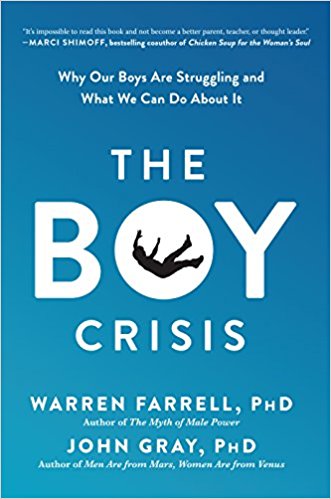![]()
Why boys are in trouble
National Post, By Donna Laframboise, January 5th,1999
Boys have been painted as the bad guys in the push to encourage girls to succeed, leaving many young men feeling confused and alienated, wondering what they did wrong
Chris Gardner, The Associated Press
According to psychologist and author William Pollack, 'sports are the one arena in which many of society's traditional strictures about masculinity are often loosened, allowing boys to experience parts of themselves they rarely experience elsewhere.'
When Harvard Medical School psychologist William Pollack administered a test to a group of 150 teenaged boys a few years ago, the results were shocking.
Designed to ascertain their feelings about impending adulthood, the test involved showing the boys a drawing of a man wearing a shirt and tie sitting at a desk while gazing with a neutral expression at a photo of a woman with two children. Asked to write a story about the picture, only 15% of the boys envisioned a contented family man. Instead, the overwhelming majority constructed narratives about lonely husbands working overtime to support their families, divorced men missing their loved ones, and grief-stricken widowers.
In Real Boys: Rescuing Our Sons from the Myths of Boyhood, Pollack cites this study and dozens of others as evidence that "boys today are in serious trouble."
As co-director of the Center for Men at McLean Hospital/Harvard Medical School, and a founding member of the American Psychological Association's Society for the Psychological Study of Men and Masculinity, Pollack has been studying male mental health for the past two decades. He says that behind their confident exteriors and self-protective bravado lurk many "sad, scared, and lonely boys." Even at the end of the 20th century, he says, we are raising boys who are afraid to ask for help for fear of being judged insufficiently masculine.
"They feel it is necessary to cut themselves off from any feelings that society teaches them are unacceptable for men and boys -- fear, uncertainty, feelings of loneliness, and need," he says. "While we may joke about how adult males won't ask for directions when they're lost, it is no laughing matter that so many of our boys feel they can't reach out for the emotional compass they so desperately need."
He has no quarrel with all the attention paid to girls over the past 20 years. But his book argues that society has failed to direct a fraction of that energy toward ensuring that boys also achieve their full potential.
For Pollack, the fact that young men commit suicide about six times as often as their female counterparts is of huge concern. So is the fact that the criteria used to diagnose depression is weighted heavily toward symptoms (such as weepiness) that Read More ..pressive adult females -- in contrast to reticent young males -- are likely to display.
He further charges that boys encounter an educational system that favours a learning style closer to female inclinations than male ones. Data from several countries indicates that it's boys, not girls, who are now academically disadvantaged. In Canada, Australia, the United Kingdom and the U.S., boys score lower on literacy tests, drop out of school sooner, and suffer from Read More ..arning and behavioural problems. American girls in Grade 8 are now "twice as likely to aspire to a career in management, the professions, or business" than are boys.
In recent years, many enlightened school districts have compelled their staff to take gender equity courses with the result, says Pollack, that teachers have "become especially vigilant, even obsessive, about making sure that the voices of girls" are heard in their classrooms. But in the process, the other half of the human race has sometimes been cast as the villain.
Boys are considered troublemakers because they don't sit as quietly or behave as orderly as little girls. Over the past five years, the number of children diagnosed with attention deficit disorder in the United States has doubled. The fact that nine out of 10 of these children are boys has led Pollack and others to wonder whether schools and mental health workers have "pathologized what is simply normal for boys."
In some schools, "a boy with ordinary exuberance may be 'punished' by being placed in classes intended for learning-disabled children or sent regularly to a detention room where he sits unattended for several periods, losing valuable classroom time . . . this may mark the beginning of a life relegated to second-class economic and intellectual citizenship."
Pollack reports that he has been in many classrooms, in schools with good reputations, where boys are bribed with "a better grade, an early recess, or an extra star on their good-behaviour tally sheet" if they agree not to bother the teacher by raising their hand more than once a class.
"Ironically, they're asking boys to act more like the old stereotype of the passive, 'feminine' girl."
The mere presence of boys can also be viewed with suspicion, since society tends, says Pollack, "to believe that there is something inherently dangerous or toxic about boys." Linden School, the prestigious all-girl Toronto institution that advertises that its students, starting at Grade 4, "go to school unafraid of sexual harassment," is a case in point.
"We are all too ready to offer advice to girls and to blame boys," says Pollack. Girls "are legitimately encouraged to explore their feelings and to communicate assertively. Boys, however, are lectured at . . . The attitude seems to be that boys don't have their own confusions."
While girls who "joke about the 'bulge' in football players' pants are unlikely to be branded as sexual harassers," he says, when the offender is a young male "we seem to forget his need to play, experiment, and fail in order to grow. Instead, we respond as though he is a full-fledged aggressor."
While the past 30 years have freed girls from restrictive, 19th-century attitudes about what constitutes permissible feminine behaviour, Pollack says boys are still trapped in their own gender straightjacket.
He talks about five-year-olds being shamed and compared to girls because they aren't as proficient as other boys at sports. He writes about Grade 4 boys being disciplined by their principal for "inappropriate touching and sexual expression" after hugging each other on the first day of school. He quotes a 15-year-old male who says: "I guess it's hard being a guy because there are so many things that a normal [italics added] person would do that you are not allowed or expected to do."
According to Pollack, all this pressure exacts a heavy toll on the average male. The straitjacket "drains boys' energy because it calls upon them to perform a constant 'acting job,' " he says. Males must "pretend to be confident when they may feel afraid, sturdy when they feel shaky, independent when they may be desperate for love, attention, and support."
Adding insult to injury, even though our society still pressures the youngest of boys into burying their true feelings, it also castigates them for not being sufficiently sensitive, empathetic, and communicative in their relations with women.
"It's as if our sons are unwittingly mirroring back to us our own adult ambivalence about masculinity and trying in vain to accept and internalize two diametrically opposed views of manhood," says Pollack.
"In short, we want our boys to be sensitive New Age guys and still be cool dudes. Is it any wonder that a lot of boys are confused by this double standard?"
* Related Site
[21]Dr. William Pollack
Home page for the author of Real Boys: Rescuing Our Sons from the Myth of Manhood.



